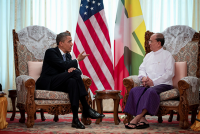
This post was written by STAND’s Policy Coordinator, Roberta Barnett. Roberta is a junior at Columbia University.Â
Anyone who has paid attention to Burma in the past five years has noticed great progress. Since the 2007 “Saffron Revolution,” the government has notably released hundreds of political prisoners, allowed contested elections, and opened itself up to civilian rather than military rule. Noted opposition leader and totem to democracy Aung San Suu Kyi, once under house arrest, now participates in the Burmese House of Representatives.
President Obama spoke on Burma’s transition at his commencement speech at West Point, describing the move from an “intractable dictatorship” to a nation of political reforms.  Burma has become much closer with the United States under the Obama administration, exchanging the first ambassadors and visits by leadership to both countries in decades. Such is a victory for diplomatic relations with Burma. The President went on to say:
“We’re now supporting reform and badly needed national reconciliation through assistance and investment, through coaxing and, at times, public criticism. And progress there could be reversed, but if Burma succeeds we will have gained a new partner without having fired a shot — American leadership.”
Of course, a commencement speech is going to be at least somewhat optimistic, but the President simplifies what are fairly pervasive problems in Burma. Recently, with the expulsion of Doctors without Borders and declining conditions in refugee camps forBurma’s Rohingya Muslims, western media has likened them to “concentration camps.” Just days ago, several reporters were sentenced to 10 years on hard labor for reporting on possible chemical productions facilities. Furthermore, Burma’s constitution still holds that one-quarter of the parliament seats in the country are reserved for military, a reminder that the old regime may not be entirely ready to relinquish leadership to democratic opposition.
One Burmese democracy advocate told the Washington Post that she thinks, “liberalization is over and the regime doesn’t want to give power through democratic elections.” Congressmen and women have also voiced concerns about the country’s commitment to human rights and humanitarian practices. The White House and State Department are caught between the need to make friends abroad and being self-appointed harbingers of democratic governance. The two objectives are seemingly at odds, and yet one is less likely to happen in the long-term without the other.
As Burma becomes more strategically important for a foreign policy pivoting East, our constituency will face both challenges and opportunities. While the State Department may have to choose its human rights and humanitarian battles, weighing them against political, economic, and diplomatic factors, the United States leadership will also enjoy a closer relationship with Burma’s government. As this relationship deepens, the impact of American political and diplomatic decisions on Burma will likewise deepen. In this way, our advocacy on Burma means more moving forward than perhaps it ever has.
